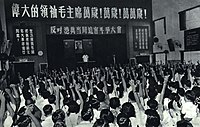| Committee of Hong Kong–Kowloon Chinese Compatriots of All Circles for the Struggle Against Persecution by the British Authorities in Hong Kong | |||||||||||||
|---|---|---|---|---|---|---|---|---|---|---|---|---|---|
 Struggle Committee meeting, 30 August 1967 | |||||||||||||
| Also known as | Struggle Committee | ||||||||||||
| Leader | Yeung Kwong | ||||||||||||
| Dates of operation | 16 May – 12 September 1967 | ||||||||||||
| Motives | Decolonisation of Hong Kong | ||||||||||||
| Size | 104 members | ||||||||||||
| Means of revenue | Financial support from the government of the People's Republic of China | ||||||||||||
| Battles and wars | 1967 Hong Kong riots | ||||||||||||
| Designated as a terrorist group by | |||||||||||||
| Chinese name | |||||||||||||
| Traditional Chinese | 港九各界同胞反對港英迫害鬥爭委員會 | ||||||||||||
| Simplified Chinese | 港九各界同胞反对港英迫害斗争委员会 | ||||||||||||
| |||||||||||||
| Abbreviation | |||||||||||||
| Traditional Chinese | 鬥委會 | ||||||||||||
| Simplified Chinese | 斗委会 | ||||||||||||
| |||||||||||||
The Committee of Hong Kong–Kowloon Chinese Compatriots of All Circles for the Struggle Against Persecution by the British Authorities in Hong Kong, often shortened to the Struggle Committee, was a political committee which opposed the British colonial administration in Hong Kong. It was established by pro-Chinese Communist Party (CCP) activists during the 1967 Hong Kong riots. Yeung Kwong, the then chairman of the Hong Kong and Kowloon Federation of Trade Unions, led the Struggle Committee as the chairman of a 17-member executive committee.
Although the British Hong Kong government blamed the Struggle Committee for a series of bombings during the 1967 riots, the group was dysfunctional and failed to unite the anti-colonial movement in Hong Kong. Before being banned by the colonial authorities in September 1967, the Struggle Committee held only two meetings.